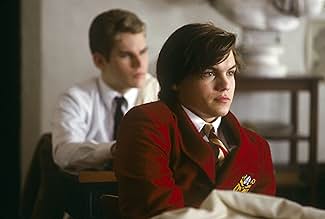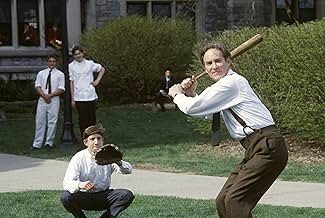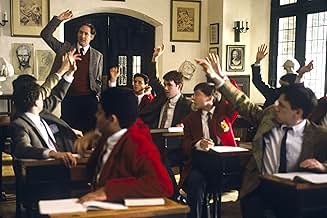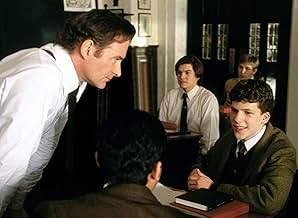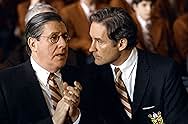AVALIAÇÃO DA IMDb
6,9/10
18 mil
SUA AVALIAÇÃO
Um professor do ensino médio tenta resgatar um aluno incorrigível.Um professor do ensino médio tenta resgatar um aluno incorrigível.Um professor do ensino médio tenta resgatar um aluno incorrigível.
- Prêmios
- 2 indicações no total
Gabriel Millman
- Robert Brewster
- (as Gabe Millman)
- Direção
- Roteiristas
- Elenco e equipe completos
- Produção, bilheteria e muito mais no IMDbPro
Enredo
Você sabia?
- CuriosidadesWhen filming the movie, the location (Emma Willard school in Troy, NY) was still operating as a girl's school. Emile Hirsch reportedly complained about the students, claiming that they were pestering him for his phone number. He also (reportedly) said some unsavory things about the school in general. When the students heard about this, they demanded an apology from Hirsch, which he delivered in front of the entire student body. At the school viewing, whenever he appeared on screen, the girls booed loudly and stories about him still circulate through the student body.
- Erros de gravaçãoWhen the girls are removing their shirts to go skinny-dipping, a Victoria's Secret Body by Victoria bra is revealed. That bra is from the time the film was made, not the mid-1970s when the scene takes place.
- Citações
William Hundert: As a great Aristophanes once wrote-- roughly translated-- "Youth ages, immaturity is outgrown. Ignorance can be educated and drunkenness sobered, but stupid... lasts forever."
- Trilhas sonorasFunk 49
Written by Jim Fox, Joe Walsh, and Dale Peters
Performed by James Gang
Courtesy of MCA Records
Under license from Universal Music Enterprises
Avaliação em destaque
Perhaps teacher movies should be judged on their own merits, but it's human nature to compare. Although I also love Dead Poet's Society, I consider The Emperor's Club one of the most compelling movies I have ever seen. The two are actually worlds apart, with Emperor's Club definitely a more cerebral film. Dead Poets seems more student oriented (students shun conformity as a result of teacher impact) and Emperor's Club more teacher focused (teacher struggles to inspire challenging student and is faced with difficult choices). Also, they have very distinct themes, with Dead Poets focusing more on individuality and 'seizing the day', while Emperor's Club revolves around character and ethics. Unlike Dead Poets (and also Mona Lisa Smile), the Emperor's Club teacher has no controversial subject matter or approaches, just relatively traditional (though passionate & effective) teaching methods.
The story depicts Mr. Hundert, a highly respected and idealistic Classics professor at an ivy covered, prestigious boys' prep school, St. Benedict's. He tries to impart a passion for Greek & Roman history to his relatively motivated students, while also conveying the importance of principles and contribution to society. All passes smoothly until the arrival of Sedgewick Bell, the obnoxious and rebellious son of a slimy Senator (who neglects his 'nuisance' offspring and exhibits an unfortunate tendency to profanity). A battle of wills ensues between teacher and student, as Sedgewick not only disrupts the class himself but inspires rowdy disrespect among his classmates. Mr. Hundert sees the vast potential in this antagonistic student and makes every effort to motivate Sedgewick to apply himself to his studies and also to exhibit personal integrity. In the process, Mr. Hundert, himself a dedicated teacher with great integrity, neglects his other students to focus on the one. He illegitimately enables Sedgewick to participate as a finalist in the school's annual Mr. Julius Caesar Contest, secretly passing over the truly deserving student, Martin Blythe. A reunion 25 years later will depict the impact of this teacher's flawed choices on his former student's character and whether or not past injustices can finally be righted.
I don't want to give the outcome away, but this reunion provides a fascinating portrait of Mr. Hundert's students as grown men. We can examine the world's view of their success versus our own, witnessing their career choices, their wives & families, and especially their character traits...whether contributory and noble or self absorbed and dishonourable. Compelling glimpses of two of these student's offspring, Robert Bell and Martin Blythe IV, prove to be incredibly revealing.
Kevin Kline, an under rated actor, is masterfully convincing in the role of the scholarly, dignified, and conflicted Mr. Hundert, and his 25 year aging process seems well depicted. Also, the roles of the boys Martin, Louis, Deepak, and of course the unpleasant Sedgewick are all well cast, as well as their older versions.
This is not simply another great film about an extraordinary teacher who has a profound impact upon his students. What distinguishes this movie from the rest is that Mr. Hundert, though a wonderfully dedicated and moral teacher, is himself flawed and compromises his own principles. In some respects, this actually makes him a much more three dimensional, realistic, and compelling character than such previous exemplary teachers as Mr. Chips (Good Bye, Mr. Chips), Mr. Keating (Dead Poets Society), and Mr. Holland (Mr. Holland's Opus). The theme here revolves not only around Mr. Hundert's impact on the boys but also his inner conflict, actually more significant than any external struggle with the rabble rousing Sedgewick or the misguided system that focuses more on fund raising than academic excellence. The film makes the point that sometimes the moral choice is not always clear cut, that crossing an unethical boundary can appear all too justifiable, and that one unprincipled decision may lead to another. There is a subtly conveyed sense as to the extent that Mr. Hundert's unethical decisions have haunted him during the intervening decades and possibly even affected his subsequent career path, as he is passed over for the Headmaster's position and begins to question his own value as an educator.
The little sub plot is actually quite engaging (not irrelevant, as some claim) that portrays the potential romance between Mr. Hundert and Elizabeth, a lovely but married fellow teacher. Its purpose is to give another indication of Mr. Hundert's character and integrity, this time revealed through his personal life. Although these two are obviously close kindred spirits with a mutual attraction, he makes no attempt to move beyond platonic friendship. His emotional but restrained response is well conveyed when Elizabeth announces that she is moving to England with her husband, who has obtained a position at Oxford.
Personally, I found all the Greek & Roman History class scenes quite engaging and enjoyed the competition with its trio of toga clad contestants. It all made me wish I was a student myself in Mr. Hundert's Classics class, surrounded by all those busts of Cicero, Socrates, Plato, and Caesar.
The Emperor's Club is a unique, intelligent, and thought provoking film that contrasts society's misguided values with the truly meaningful and important. Very few movies today deal with ethical issues, but this one explores such moral matters as teacher favouritism, bending the rules, and cheating. It prompts discussion, encouraging the viewer to question his own views of right and wrong in these situations. The movie also challenges our thinking as to exactly what does constitute teacher success, as we watch Mr Hundert come to grips with his own personal definition. The quiet ending may be less intense and dramatic than Dead Poets Society, but is equally moving and powerful. As a former teacher myself, my hat goes off to Mr. Hundert. Although very human and with some lessons to learn himself, this dedicated teacher serves as an inspirational role model for viewers of this film as well as for his students.
The story depicts Mr. Hundert, a highly respected and idealistic Classics professor at an ivy covered, prestigious boys' prep school, St. Benedict's. He tries to impart a passion for Greek & Roman history to his relatively motivated students, while also conveying the importance of principles and contribution to society. All passes smoothly until the arrival of Sedgewick Bell, the obnoxious and rebellious son of a slimy Senator (who neglects his 'nuisance' offspring and exhibits an unfortunate tendency to profanity). A battle of wills ensues between teacher and student, as Sedgewick not only disrupts the class himself but inspires rowdy disrespect among his classmates. Mr. Hundert sees the vast potential in this antagonistic student and makes every effort to motivate Sedgewick to apply himself to his studies and also to exhibit personal integrity. In the process, Mr. Hundert, himself a dedicated teacher with great integrity, neglects his other students to focus on the one. He illegitimately enables Sedgewick to participate as a finalist in the school's annual Mr. Julius Caesar Contest, secretly passing over the truly deserving student, Martin Blythe. A reunion 25 years later will depict the impact of this teacher's flawed choices on his former student's character and whether or not past injustices can finally be righted.
I don't want to give the outcome away, but this reunion provides a fascinating portrait of Mr. Hundert's students as grown men. We can examine the world's view of their success versus our own, witnessing their career choices, their wives & families, and especially their character traits...whether contributory and noble or self absorbed and dishonourable. Compelling glimpses of two of these student's offspring, Robert Bell and Martin Blythe IV, prove to be incredibly revealing.
Kevin Kline, an under rated actor, is masterfully convincing in the role of the scholarly, dignified, and conflicted Mr. Hundert, and his 25 year aging process seems well depicted. Also, the roles of the boys Martin, Louis, Deepak, and of course the unpleasant Sedgewick are all well cast, as well as their older versions.
This is not simply another great film about an extraordinary teacher who has a profound impact upon his students. What distinguishes this movie from the rest is that Mr. Hundert, though a wonderfully dedicated and moral teacher, is himself flawed and compromises his own principles. In some respects, this actually makes him a much more three dimensional, realistic, and compelling character than such previous exemplary teachers as Mr. Chips (Good Bye, Mr. Chips), Mr. Keating (Dead Poets Society), and Mr. Holland (Mr. Holland's Opus). The theme here revolves not only around Mr. Hundert's impact on the boys but also his inner conflict, actually more significant than any external struggle with the rabble rousing Sedgewick or the misguided system that focuses more on fund raising than academic excellence. The film makes the point that sometimes the moral choice is not always clear cut, that crossing an unethical boundary can appear all too justifiable, and that one unprincipled decision may lead to another. There is a subtly conveyed sense as to the extent that Mr. Hundert's unethical decisions have haunted him during the intervening decades and possibly even affected his subsequent career path, as he is passed over for the Headmaster's position and begins to question his own value as an educator.
The little sub plot is actually quite engaging (not irrelevant, as some claim) that portrays the potential romance between Mr. Hundert and Elizabeth, a lovely but married fellow teacher. Its purpose is to give another indication of Mr. Hundert's character and integrity, this time revealed through his personal life. Although these two are obviously close kindred spirits with a mutual attraction, he makes no attempt to move beyond platonic friendship. His emotional but restrained response is well conveyed when Elizabeth announces that she is moving to England with her husband, who has obtained a position at Oxford.
Personally, I found all the Greek & Roman History class scenes quite engaging and enjoyed the competition with its trio of toga clad contestants. It all made me wish I was a student myself in Mr. Hundert's Classics class, surrounded by all those busts of Cicero, Socrates, Plato, and Caesar.
The Emperor's Club is a unique, intelligent, and thought provoking film that contrasts society's misguided values with the truly meaningful and important. Very few movies today deal with ethical issues, but this one explores such moral matters as teacher favouritism, bending the rules, and cheating. It prompts discussion, encouraging the viewer to question his own views of right and wrong in these situations. The movie also challenges our thinking as to exactly what does constitute teacher success, as we watch Mr Hundert come to grips with his own personal definition. The quiet ending may be less intense and dramatic than Dead Poets Society, but is equally moving and powerful. As a former teacher myself, my hat goes off to Mr. Hundert. Although very human and with some lessons to learn himself, this dedicated teacher serves as an inspirational role model for viewers of this film as well as for his students.
- roghache
- 25 de abr. de 2006
- Link permanente
Principais escolhas
Faça login para avaliar e ver a lista de recomendações personalizadas
- How long is The Emperor's Club?Fornecido pela Alexa
Detalhes
- Data de lançamento
- País de origem
- Idioma
- Também conhecido como
- The Emperor's Club
- Locações de filme
- Empresas de produção
- Consulte mais créditos da empresa na IMDbPro
Bilheteria
- Orçamento
- US$ 12.500.000 (estimativa)
- Faturamento bruto nos EUA e Canadá
- US$ 14.118.751
- Fim de semana de estreia nos EUA e Canadá
- US$ 3.846.780
- 24 de nov. de 2002
- Faturamento bruto mundial
- US$ 16.318.449
- Tempo de duração1 hora 49 minutos
- Cor
- Mixagem de som
- Proporção
- 1.85 : 1
Contribua para esta página
Sugerir uma alteração ou adicionar conteúdo ausente

Principal brecha
By what name was O Clube do Imperador (2002) officially released in India in English?
Responda


